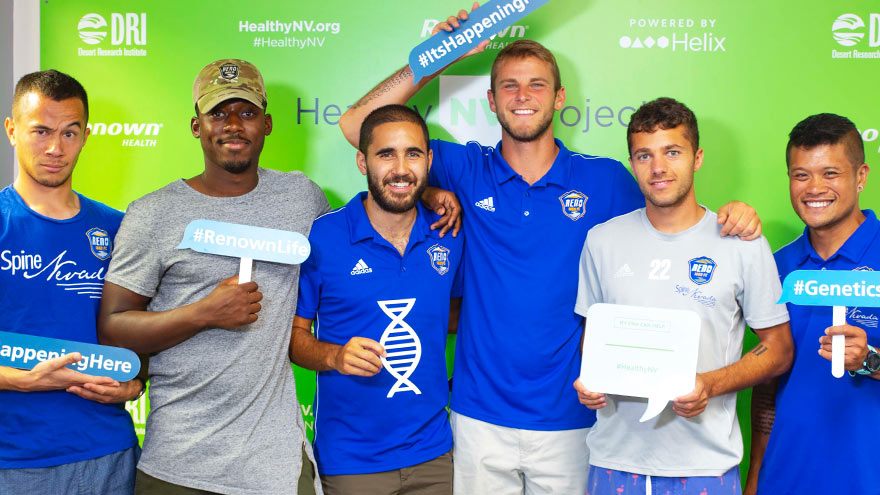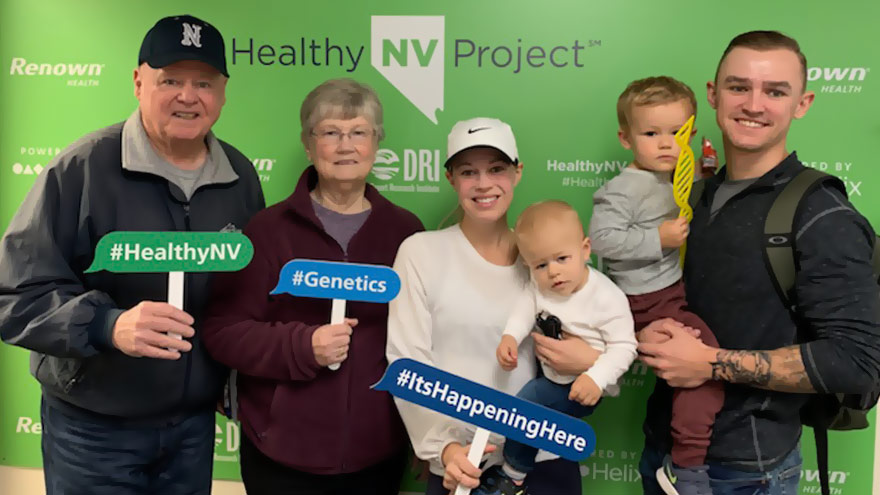Search
-
-
11Jun
Renown Institute for Heart & Vascular Health proudly offers the free Cardiovascular Support Group. Please join us if you or anyone you know has been diagnosed with cardiovascular issues. Meet and get to know the Cardiovascular Quality Team from the Renown Institute for Heart & Vascular Health on the second Tuesday of every month from 2-3 p.m. This group is open to all cardiovascular patients and their families. Learn about managing and living with cardiovascular issues in a supportive group environment. Virtual attendees will receive instructions on how to join the meeting the day before the event. Complimentary refreshments and informative materials will be provided!
Read More About Cardiovascular Support Group
-
-
-
10Dec
Renown Institute for Heart & Vascular Health proudly offers the free Cardiovascular Support Group. Please join us if you or anyone you know has been diagnosed with cardiovascular issues. Meet and get to know the Cardiovascular Quality Team from the Renown Institute for Heart & Vascular Health on the second Tuesday of every month from 2-3 p.m. This group is open to all cardiovascular patients and their families. Learn about managing and living with cardiovascular issues in a supportive group environment. Virtual attendees will receive instructions on how to join the meeting the day before the event. Complimentary refreshments and informative materials will be provided!
Read More About Cardiovascular Support Group
-
-
-
13Aug
Renown Institute for Heart & Vascular Health proudly offers the free Cardiovascular Support Group. Please join us if you or anyone you know has been diagnosed with cardiovascular issues. Meet and get to know the Cardiovascular Quality Team from the Renown Institute for Heart & Vascular Health on the second Tuesday of every month from 2-3 p.m. This group is open to all cardiovascular patients and their families. Learn about managing and living with cardiovascular issues in a supportive group environment. Virtual attendees will receive instructions on how to join the meeting the day before the event. Complimentary refreshments and informative materials will be provided!
Read More About Cardiovascular Support Group
-
-
-
10Sep
Renown Institute for Heart & Vascular Health proudly offers the free Cardiovascular Support Group. Please join us if you or anyone you know has been diagnosed with cardiovascular issues. Meet and get to know the Cardiovascular Quality Team from the Renown Institute for Heart & Vascular Health on the second Tuesday of every month from 2-3 p.m. This group is open to all cardiovascular patients and their families. Learn about managing and living with cardiovascular issues in a supportive group environment. Virtual attendees will receive instructions on how to join the meeting the day before the event. Complimentary refreshments and informative materials will be provided!
Read More About Cardiovascular Support Group
-
-
-
9Jul
Renown Institute for Heart & Vascular Health proudly offers the free Cardiovascular Support Group. Please join us if you or anyone you know has been diagnosed with cardiovascular issues. Meet and get to know the Cardiovascular Quality Team from the Renown Institute for Heart & Vascular Health on the second Tuesday of every month from 2-3 p.m. This group is open to all cardiovascular patients and their families. Learn about managing and living with cardiovascular issues in a supportive group environment. Virtual attendees will receive instructions on how to join the meeting the day before the event. Complimentary refreshments and informative materials will be provided!
Read More About Cardiovascular Support Group
-
-
-
12Nov
Renown Institute for Heart & Vascular Health proudly offers the free Cardiovascular Support Group. Please join us if you or anyone you know has been diagnosed with cardiovascular issues. Meet and get to know the Cardiovascular Quality Team from the Renown Institute for Heart & Vascular Health on the second Tuesday of every month from 2-3 p.m. This group is open to all cardiovascular patients and their families. Learn about managing and living with cardiovascular issues in a supportive group environment. Virtual attendees will receive instructions on how to join the meeting the day before the event. Complimentary refreshments and informative materials will be provided!
Read More About Cardiovascular Support Group
-
-
-
8Oct
Renown Institute for Heart & Vascular Health proudly offers the free Cardiovascular Support Group. Please join us if you or anyone you know has been diagnosed with cardiovascular issues. Meet and get to know the Cardiovascular Quality Team from the Renown Institute for Heart & Vascular Health on the second Tuesday of every month from 2-3 p.m. This group is open to all cardiovascular patients and their families. Learn about managing and living with cardiovascular issues in a supportive group environment. Virtual attendees will receive instructions on how to join the meeting the day before the event. Complimentary refreshments and informative materials will be provided!
Read More About Cardiovascular Support Group
-
-
CEO Blog: Improving Health Through Genetics and Big Data
Renown Health President and CEO Tony Slonim, MD, DrPH, discusses efforts nationwide to develop a more effective and efficient way to deliver care. explains the benefits of Renown Health’s population health study with the Desert Research Institute and 23andMe.
Read More About CEO Blog: Improving Health Through Genetics and Big Data
-
Healthy Nevada Project: What We've Learned
As the Healthy Nevada Project expands to 50,000 study participants, researchers are sharing the health insights gleaned from the pilot phase of the project. Air pollution is a major health factor affecting northern Nevadans, according to data gathered by researchers in the pilot phase of the Healthy Nevada Project, one of the largest population health studies in the country. Today, the project — which began 18 months ago as a partnership between Renown Health and the Desert Research Institute — is expanding to add 40,000 additional participants bringing total enrollment to 50,000 Nevadans. “We are thrilled to share the first insights from our 10,000-person pilot phase and discuss how we will begin using those results to improve patient care,” says Anthony Slonim, M.D., Dr.PH., FACHE, president and CEO of Renown Health and president of Renown Institute for Health Innovation, a collaboration between Renown and DRI. Healthy Nevada Project Pilot Phase — and What Happens Next The pilot phase of the Healthy Nevada Project proved Nevadans are excited to know more about themselves and want to contribute to research that could improve health outcomes for the entire state. The pilot phase enrolled 10,000 participants in less than 48 hours and DNA sample collection from each participant was completed in just 69 working days. Based on pilot phase data, researchers have seen increased use of regional healthcare services correlated with fluctuations in air quality and so-called “bad air events” such as wildfires and atmospheric inversions. In phase two, Renown IHI will evaluate possible links between genetics and increased susceptibility to respiratory ailments. Study researchers also announced care providers and scientists will begin working on a number of clinical programs and scientific studies focused specifically on Washoe County’s high age-adjusted death rates for heart disease, cancer and chronic lower respiratory disease. Collectively, these conditions among local residents stand at 33 percent above the national rate. In the coming months, Renown IHI will begin providing advanced calcium score screenings to pilot phase participants at higher risk for cardiovascular disease. This will allow researchers to examine the link between genetics and calcium buildup in the heart. Researchers are also evaluating future studies focused on age-related macular degeneration and breast cancer risks in northern Nevada. Pilot Phase Insights Fifty percent of pilot study participants responded to a comprehensive, socioeconomic survey, which revealed: High rates of lower respiratory disease in northern Nevada and co-morbidities such as diabetes and hypertension suggest air pollution in northern Nevada is a confounding and significant factor in health. Study participants had parents who died from cancer and heart disease at a higher rate than the age-adjusted national average. Study participants exercised less than recommended by the American Heart Association and expressed interest in receiving help with behavior modification using diet/nutrition and weight loss tools. In phase two, if study participants choose to complete a follow-up survey, they will have the chance to pick an additional health and wellness app specific to their individual genetic results. Learn More To see if you are eligible to participate in the study, to sign up for study updates and for full details on the Healthy Nevada Project, please visit HealthyNV.org.
-
Early Onset of Puberty in Girls on the Rise
Many factors are contributing to the rise of early onset puberty in girls. Learn what they are below and how you can support your daughter. The number of girls experiencing early puberty has increased dramatically over the last few years and continues to grow. More and more girls in the U.S. are starting to show signs of development before the age of 8. Recent studies show that up to 10 percent of Caucasian girls and 23 percent of African American girls are showing signs of puberty by age 7. What’s Contributing to Early Puberty in Girls? Determining the exact cause is difficult. But experts agree that several factors may be contributing to these growing numbers. Increasing rates of childhood overweight and obesity. Excess body fat alters the levels of hormones responsible for the acceleration of pubertal timing. Physical inactivity may decrease melatonin levels, which can also trigger pubertal development. Increased animal protein intake. Higher total protein, animal protein and meat intake in children ages 3 to 7 have been associated with earlier onset of menstruation. High protein intake elevates IGF-1 levels and promotes growth, which could accelerate the onset of puberty. Poor diet. Children with lower-nutrient diets tend to enter puberty earlier. A diet rich in processed foods and meats, dairy, and fast food is disruptive to normal physical development. Exposure to EDCs (endocrine-disrupting chemicals). EDCs are synthetic chemicals found in plastics, pesticides, fuels and other industrial chemicals that inhibit or alter the action of natural hormones. Because EDCs accumulate in the fatty tissues of animals, animal foods contain higher levels of these chemicals than plant foods. Exposure to BPA (bisphenol A). BPA is an industrial petrochemical found in a variety of products including plastics, tin-can linings and even cash register receipts. Because it acts as a synthetic estrogen it may speed up pubertal development. Soy products. Soy contain isoflavones which are converted to phytoestregens in the body, and are similar to the hormone estrogen, Dr. Chelsea Wicks says. “Soy consumed from natural food sources is likely safe and will not cause abnormal hormones levels. However, when consumed in large amounts, such as with soy supplements or in more processed foods, there have been links to chronic medical problems due to elevated estrogen levels. I feel a good answer to this is to continue working on eating fresh foods and trying to avoid the processed, packaged foods as this will be best for overall general nutrition as well,” she adds. What You Can Do While some genetic factors play a role in the early onset of puberty, parents can help lessen environmental causes of the condition. Encourage and help your child to maintain a healthy weight with proper nutrition and exercise. Avoid exposure to hormones such as estrogen and testosterone that may be found in hair products, medications and nutritional supplements. Avoid exposure to EDCs and BPA. Offer your child a diet centered around whole plant foods rather than animal foods, which will help keep protein intake within a safe range and reduce consumption of EDCs. Create a supportive environment for your daughter. Avoid commenting on her appearance and instead focus on her achievements, academic successes or artistic talents. Speak to her openly and honestly about the physical changes she’s experiencing — that although these changes are normal, she’s simply developing early — and that ultimately her peers will undergo the same changes. Encourage your daughter to continue participating in social activities and pursuing her interests, and reassure her you are always open to discuss any questions or worries. If you are concerned that your child may be going through these changes before expected, speak with your pediatrician. Sources: Early Puberty: Causes and Consequences When Is Puberty Too Early? Precocious Puberty (Early Puberty) Precocious Puberty
-
The Healthy Nevada Project Changed My Life: A Local Mom's Story
Read about Jordan Stiteler, a local mom who says the Healthy Nevada Project provided insights into her family’s genetic makeup — and the likely cause of her dad and great grandfather’s deaths. Now she is changing her life due to her new diagnosis of familial hypercholesterolemia, which will allow her to take steps toward preventing the same fate. Jordan Stiteler’s dad died suddenly of a stroke nearly ten years ago — at only 45 years old. His grandfather died at age 40. Now through the Healthy Nevada Project’s no-cost genetic testing, she is closer to understanding why that may have happened. And she can take proactive steps to prevent the unhealthy symptoms that often lead to a stroke and heart problems. After getting her Geno 2.0 by National Geographic ancestry report, Stiteler got a call from Renown Institute for Heart & Vascular Health Cardiologist and Renown IHI Director of Research, Dr. Christopher Rowan. “They told me that I have FH, which is familial hypercholesterolemia,” she said. “I have genetically very high cholesterol because I have a non-functioning gene that doesn’t get rid of my cholesterol like a normal body would.” Familial Hypercholesterolemia: Simple Life Changes Dr. Rowan told Stiteler it is curable with medication and a change in lifestyle. Stiteler has embraced healthy lifestyle changes by exercising more and eating healthier. “It is so important. Being a mom, I think you have so much more to live for. Having this information has changed my life.” Stiteler feels confident FH affected her Dad. “It is helping my family realize that we need to get tested,” she said. “There were big milestones that my Dad missed. He didn’t get to see either of us get married or have our children. That was huge.” She has become passionate about sharing the need to join the Healthy Nevada Project as her way of helping to prevent other families from possibly going through what she and her family did with the early loss of her Dad. In addition to FH results, the Healthy Nevada Project is returning clinical results on BRCA 1/2 (hereditary breast and ovarian cancer) and Lynch syndrome (colorectal and endometrial cancer) to consenting study participants. To sign up for the Healthy Nevada Project, go to HealthyNV.org. Join the Healthy Nevada Project Recruitment for phase two is still open. In addition to opting in to receive clinical results, participants receive National Geographic’s Geno 2.0 ancestry app at no cost. They also have the chance to pick an additional app for health and wellness after completing a follow-up survey. Learn More or Sign Up
Read More About The Healthy Nevada Project Changed My Life: A Local Mom's Story
-
Healthy Nevada Project Returning Clinical Results to Participants
The Healthy Nevada Project – a first-of-its-kind population health study combining genetic, clinical, social and environmental data – has reached another landmark milestone. The study is notifying study participants at risk for familial hypercholesterolemia, BRCA and Lynch syndrome. “I took part in the Healthy Nevada Project to find out my ancestry. I didn’t even realize the test could give me so much information,” says 29-year-old Jordan Stiteler, who was recently diagnosed with familial hypercholesterolemia (also known as FH) through the Healthy Nevada Project. “After my dad passed away suddenly at age 45, I learned I had high cholesterol but I didn’t know it was genetic and I didn’t get an FH diagnosis until last week,” Jordan explains. “I immediately changed my diet, started walking more and doing more cardio. I also set up an appointment with my primary care physician for the first time in a while. I’ve talked with my family and even strangers about testing since my diagnosis. I hope my story will inspire others to test and can save someone’s family from going through the same loss I did.” Healthy Nevada Project Notifying Patients of Familial Hypercholesterolemia Risks Jordan is among the first Healthy Nevada Project participants to receive clinical results from the genetic study led by Renown Institute for Health Innovation (Renown IHI) – a collaboration between Renown and the Desert Research Institute Foundation. This groundbreaking population health study is now reaching out to study participants like Jordan, who asked to be notified of health risks. If study volunteers choose, the project will also provide guidance on treatment and additional testing for family members who may also be at risk. The project is starting with the return of FH risks which is a genetic tie to high cholesterol. Just a few months ago, a paper in the Journal of the American College of Cardiology recommended genetic testing become the standard of care for patients with a definite or probable FH diagnosis. Jordan says she plans to have her young son tested as well. “This is the future of health; not just reacting to sick people, but a coordinated effort between innovative technologies, data-driven researchers, and responsive practitioners to deliver personalized interventions to identify, prevent and treat disease,” says Anthony Slonim, M.D., Dr.PH., FACHE, president and CEO of Renown Health and president of Renown IHI. “As care providers, we often don’t see patients until they’re already sick and that’s a difficult problem. By embracing personal genomics, we can accelerate the ability of researchers to access data and apply those learnings back to our health system sooner.” In the Months Ahead: Notification of BRCA1/2 & Lynch Syndrome Risks The Healthy Nevada Project will start notifying study volunteers at risk for other CDC Tier 1 conditions including hereditary breast and ovarian cancer syndrome (BRCA 1/2 genes) and Lynch syndrome in the months ahead. These conditions are the key focus for the Healthy Nevada Project. The reason: Because early detection and treatment will save lives, and these conditions are some of the most common. “This research allows us to look into cancer, cardiac, respiratory illness and beyond to identify underlying causes, assess real risks and eventually initiate appropriate preventive actions much earlier. Human subject research is often intangible to participants – we are treated as subjects. The Healthy Nevada Project is creating actionable information for our participants while engaging in leading-edge research on health determinants,” said Joseph Grzymski, Ph.D., associate research professor at DRI, principal investigator of the Healthy Nevada Project and chief scientific officer for Renown Health. Landmark Population Health Study Continues to Expand Since launching two years ago, the Healthy Nevada Project has quickly evolved and expanded. The pilot project enrolled 10,000 participants in just 48 hours in September 2016. In March 2018, phase two of project expanded to an additional 40,000 participants with genetic testing partner, Helix. Helix’s genomic sequencing provides participants and researchers greater depth and quality of DNA data. With this, they can gain further insights to improve health. During a recent media roundtable announcing the return of clinical results, the Healthy Nevada Project also announced plans to complete testing of 40,000 people by the end of 2018. This will bring the project’s total enrollment to 50,000 people – approximately 10 percent of northern Nevada’s population. The Healthy Nevada Project hopes to reach more than 250,000 people in its next phase. The ultimate goal is to offer genetic testing to every Nevadan interested in learning more about their genetics and health. Join the Healthy Nevada Project Recruitment for phase two is still open. In addition to opting in to receive clinical results, participants receive National Geographic’s Geno 2.0 ancestry app at no cost. They also have the chance to pick an additional app for health and wellness after completing a follow-up survey. Learn More or Sign Up
Read More About Healthy Nevada Project Returning Clinical Results to Participants




